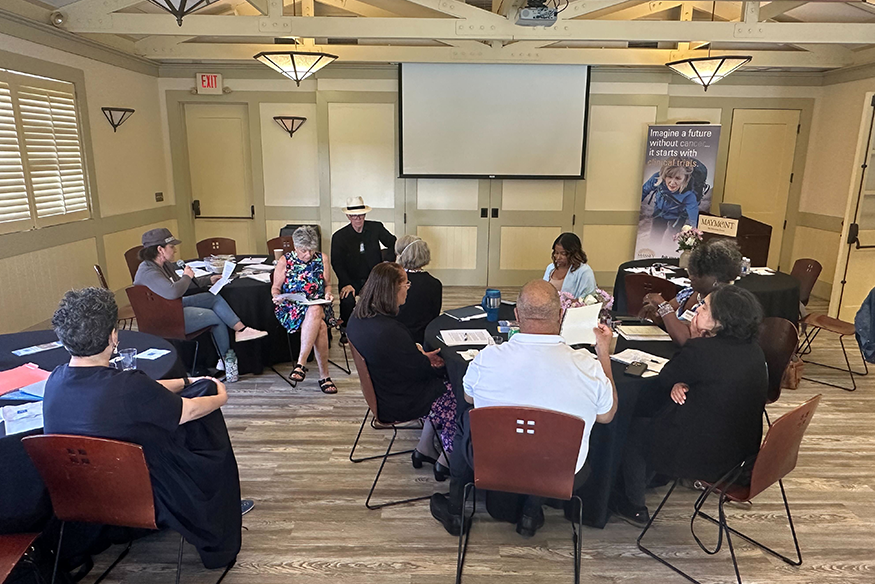Center News & Funding, Community Engagement & Health Equity, Prevention & Control, Clinical
Jun 21, 2024
 Massey patients and caregivers convened on June 15 at Maymont’s Garden Hall to discuss challenges faced by individuals navigating cancer.
Massey patients and caregivers convened on June 15 at Maymont’s Garden Hall to discuss challenges faced by individuals navigating cancer.
Christine Wilson described what life with cancer was like in the not-so-distant past — the years prior to the 1970s — when a diagnosis often silenced patients.
“The notion of advocacy did not exist at that point. The notion was that cancer was an incurable disease,” said Wilson, the vice president of advocacy communications and marketing at the National Patient Advocate Foundation (NPAF).
Wilson then shared what became the beginning of the cancer advocacy movement that helped to reduce stigmas and create a more open dialogue in society.
“I give a lot of credit to the breast cancer patients,” Wilson acknowledged. “They said, ‘Wait a minute. We are going to talk about this. This isn’t a secret.’”
Wilson’s presentation was part of the VCU Massey Comprehensive Cancer Center and NPAF working group session, Improving Access to Care and Shared Decision Making for People Living with Cancer and Chronic Disease, held June 15 at Maymont’s Garden Hall in Richmond, Virginia.
About a dozen Massey patients and caregivers convened for discussions about the challenges faced by individuals navigating a diagnosis, along with the hope that pushes them forward. The in-person session was initiated after a larger meeting in Richmond last summer and then a more intimate virtual kick off on May 1.
The working group met to tackle topics including costs of care, clinical trials, having adequate information at each decision-making point, dealing with hard conversations such as breaks or changes in treatment, end of life concerns and emotional barriers to decision making such as grief or fear.
Robert A. Winn, M.D., director and Lipman Chair in Oncology at Massey, encouraged survivors to reframe how they think about progress made in cancer. Winn recognized that science saves lives, but he also credited individuals who enroll in clinical trials for advancing it.
“The miracles of medicine are the patients who had the treatments in the first place,” said Winn. “Your stories are part of it.”
Following breakout conversations, the full group came together to tackle such topics as the role of primary care physicians in cancer treatment and shifting the focus to quality versus quantity of life.
Vanessa Spurlock recounted how her support system evolved since her diagnosis with invasive ductal carcinoma in September 2017.
“I’m glad that I went through the steps that I went through,” Spurlock said. “Although I wasn’t part of an in-person group, I was able to connect with a group of ladies online who I refer to as my “Around The World Girlz” because they are from everywhere: Philadelphia, New Orleans, Sweden, Colorado and more than 15 other locations. In 2019, I had the opportunity to meet them in person in Chicago. What started off as strangers, became family. To this day we still talk and share much of our lives “outside” of the diagnosis. I later became part of an in-person group and also found long lasting relationships with a few of them.”
Spurlock added, “I feel like a pro now. Not because I know it all but because I allowed myself to take each step, one at a time. As crazy as it sounds, I’m thankful for each step because now I can use what I learned step by step to help someone else.”
As the group spoke about the importance of communication between patients and clinicians, Wilson and Winn touched upon the responsibility that doctors have to lessen confusion from the day of diagnosis onward.
“We have to break it down so we can make it more accessible for everyone to understand,” said Winn.
NPAF team members who joined and facilitated the working group discussions also included Gwen Darien, executive vice president of Patient Advocacy, Engagement and Education; Ashley Freeman, M.P.H., manager of Stakeholder Outreach and Engagement; and Jamie Trotter, M.P.A., associate director for Patient Advocacy and Engagement.
The NPAF will now use information gathered from the session to further its mission: “dedicated to improving health care access, quality and affordability through policies, programs and practices that optimize the experience and outcomes for patients and caregivers.”
Written by: Amy Lacey
Research, Community Engagement & Health Equity
National pioneer in breast cancer and survivorship visits Massey as part of distinguished seminar seriesJul 02, 2024
Center News & Funding, Community Engagement & Health Equity, Clinical, Research, Prevention & Control
Massey’s cutting-edge clinical care and research reaches an international audience at oncology conferenceJun 14, 2024
Prevention & Control, Community Engagement & Health Equity, Center News & Funding
Luncheon celebrates growth of Facts & Faith Fridays: “Science and religion lean on one another to get the job done.”Jun 10, 2024

Treatments in clinical trials may be more effective or have fewer side effects than the treatments that are currently available. With more than 200 studies for multiple types of cancers and cancer prevention, Massey supports a wide array of clinical trials.

Massey supports hundreds of top cancer specialists serving the needs of our patients. Massey’s medical team provides a wealth of expertise in cancer diagnosis, treatment, prevention and symptom management.